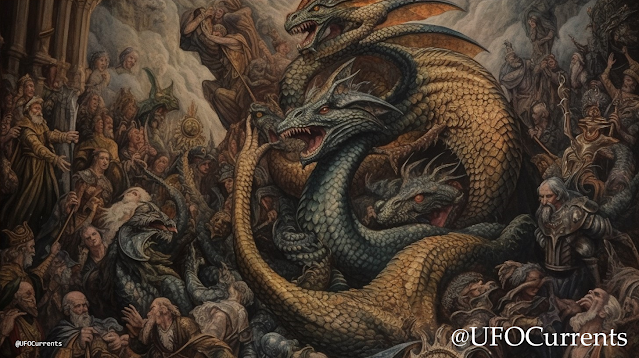Sacred, Eternal, and Unchanging: YHVH (יהוה), the Dragon
By Anthony F. Sanchez, Author & UFO Researcher
For UFO Currents
In this article, my aim is to explore the widespread phenomenon of "The Dragon", delving into their cultural and historical significance across the globe.
In the Torah, the Tetragrammaton, YHVH (יהוה), stands as the unpronounceable, sacred name of God, embodying the eternal and immutable essence of the divine. Intriguingly, some interpretations within traditional Jewish texts metaphorically envision YHVH as a dragon. This unique perspective prompts the question: why does this interpretation exist, and what does it signify within a broader cultural and historical context?
This intriguing interpretation has led me to delve deeper into the origins and implications of viewing God in such a unique light. It raises questions about the sacred and immutable nature of divinity as depicted in Judaic texts. Therefore, I embarked on a scholarly journey, engaging with biblical commentaries and religious studies, to unravel the layers behind the metaphorical portrayal of YHVH as a dragon. So, this is an exploration that aims to provide a nuanced understanding of these complex theological concepts.
Especially because the widespread belief in dragons across various cultures, both ancient and contemporary, can be attributed to a number of factors. Firstly, dragons often embody the unknown and represent the collective fears and aspirations of a society. They serve as metaphors for natural disasters, the mysteries of the universe, or even the embodiment of chaos and order. This symbolic versatility makes dragons a powerful tool for storytelling and moral lessons.
Secondly, the discovery of dinosaur fossils and other large prehistoric bones in ancient times likely contributed to the belief in dragons. Without the scientific understanding to correctly identify these remains, ancient peoples may have interpreted them as evidence of dragons or other mythical creatures.
Moreover, dragons serve as a universal archetype in the human psyche.
YHVH as a Dragon: A Jewish Metaphor
The metaphorical reading of YHVH as a dragon in Jewish texts is a fascinating exploration into the multifaceted nature of divinity depicted in Judaic traditions. This interpretation suggests a portrayal of God with attributes commonly associated with dragons: power, mystery, and guardianship. Delving into biblical commentaries and religious studies reveals a nuanced understanding of YHVH's depiction, raising intriguing questions about the sacred and immutable nature of God as seen through the lens of ancient symbolism.
The Universal Symbolism of Dragons
Dragons occupy a significant place in the mythologies and cultures across the world, symbolizing everything from natural disasters to the embodiment of chaos and order. Their symbolic versatility makes dragons a potent element in storytelling, serving as metaphors for society's collective fears and aspirations. The discovery of dinosaur fossils and other large prehistoric bones likely fueled ancient beliefs in these mythical creatures, with their remains interpreted as physical evidence of dragons' existence.
Cultural exchange has played a pivotal role in the diffusion of dragon myths, with stories adapted and transformed as they spread from one civilization to another. This global archetype, deeply rooted in the human psyche, illustrates Carl Jung's theory of the collective unconscious—a shared part of the unconscious mind harboring universal symbols and myths.
Dragons: Mythology or Reality?
The widespread belief in dragons, transcending cultures and millennia, hints at a possible reality behind these mythical beings. The metaphorical interpretation of YHVH as a dragon within Jewish tradition opens a door to a broader discussion on the existence of dragons—or entities resembling them—in ancient times. According to Randall Carlson, a geologist, anthropologist, and historian, cataclysmic events have repeatedly erased civilizations, potentially leading to the extinction of beings once integral to human existence, including dragons.
This exploration into the nature of dragons and their connection to divinity, particularly through the lens of the Anunnaki and the ancient Sumerians, further complicates our understanding of these mythical creatures. Were dragons merely symbolic representations of the divine, or could they have been real creatures or higher entities of non-human intelligence, as ancient texts and myths suggest?
Conclusion: A Journey Through Myth and Reality
The metaphorical interpretation of YHVH as a dragon in Jewish tradition, alongside the pervasive belief in dragons across various cultures, underscores a complex interplay of mythology, symbolism, and perhaps a hint of historical reality. As we continue to explore and translate ancient texts, the boundaries between myth and reality blur, offering a glimpse into humanity's attempt to understand the divine and the unknown.
The enduring fascination with dragons, from their metaphorical role in religious texts to their universal presence in global mythologies, reveals profound insights into human culture, spirituality, and our inherent desire to make sense of the world around us. Whether as metaphors for the divine or as possible reflections of real entities, dragons remain a compelling aspect of human history and imagination, inviting us to ponder the mysteries of existence and the nature of belief itself.
* * *
Anthony is the author of the books ‘UFO Nexus‘, and ‘UFO Highway 2.0‘, https://ufocurrents.com/Books.aspx
STAY AT THE FOREFRONT OF UFO DISCLOSURE
By following and participating on these platforms, you’ll ensure that you’re always at the forefront of UFO discourse.
https://Instagram.com/UFOCurrents
https://TikTok.com/@UFOCurrents
https://Twitter.com/UFOCurrents
https://Facebook.com/UFOCurrents
https://YouTube.com/@UFOCurrents
https://UFOCurrents.blogspot.com
https://pinterest.com/UFOCurrents








Comments
Post a Comment